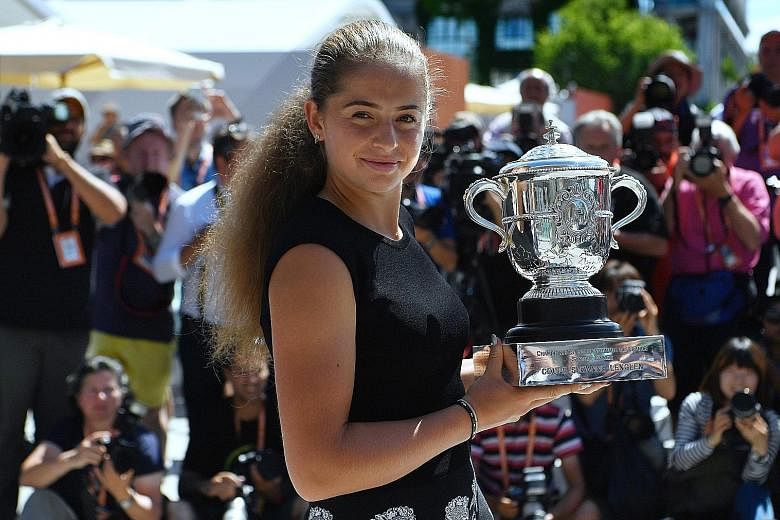PARIS • Jelena Ostapenko's first love was ballroom dancing but judging by the bruising manner in which she demolished Simona Halep to win the French Open, it could just as well have been boxing.
The 20-year-old muscled 54 winners past the Romanian en route to a 4-6, 6-4, 6-3 victory in Saturday's final.
She fired 299 winners during the tournament. But it was not all power. There was grace in that brutal hitting, and the steady footwork which is its foundation is a legacy of her balance and quick feet in the ballroom.
"At home in Riga, when I am there, I try and go ballroom dancing four times a week," Ostapenko, who speaks Russian, Latvian and English, said earlier in the tournament. "It really helps with the footwork on the court. My favourite dance? The samba, of course."
She did ballroom dancing for seven years as a child, took a break for another seven years, before dusting off the sequins in 2014.
"I have the dress, the shoes - everything has to be matching. I go to a club and dance with the teacher there, he's a professional dancer."
Her father Jevgenijs was a goalkeeper with Ukrainian club Metalurh Zaporizhya and her mother Jelena Jakovleva is a tennis coach.
Ostapenko was initially coached by her mother, with her father serving as a fitness trainer, but is now working with two-time French Open doubles champion Anabel Medina Garrigues.
Ostapenko was 10 when she first mentioned winning the French Open one day, her mother said.
"She was on an excursion with her father at Roland Garros and she said, 'Maybe one time I will become a champion here'," she added.
The early years in tennis were not easy for Ostapenko, however, as her family scrambled for the money to finance her career.
"We had to find a few different sources of revenue - via the Internet, doing a few different jobs, using our savings. But we found enough money - luckily two generous benefactors appeared who gave us money and asked to remain anonymous," said Jevgenijs.
But it paid off with his daughter winning junior Wimbledon in 2014.
Money will no longer be a problem for Ostapenko, her mother and father or half-brother Maksim, who lives in Los Angeles. Her Roland Garros victory was worth more than US$2 million (S$2.7 million) in prize money.
She has more titles in sight, vowing to stay true to her fearless, big-hitting game.
"I'm just going to try to work hard but I think if I have a really good day and I'm hitting really well, I think anything is possible," said the world No. 12. "I would like to win all of the Grand Slams. It's my goal."
AGENCE FRANCE-PRESSE, REUTERS

